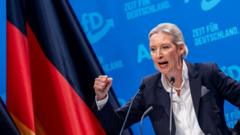As Germany gears up for an election, the Alternative für Deutschland (AfD) party, under the leadership of Alice Weidel, is making headlines with plans for mass deportations and a departure from EU agreements. This shift has sparked widespread protests and raised concerns about the party's growing radicalism.
Rising Tides: AfD's Radical Shift Towards Mass Deportations Ahead of Elections

Rising Tides: AfD's Radical Shift Towards Mass Deportations Ahead of Elections
With German elections approaching, the far-right AfD is intensifying its anti-immigration rhetoric, advocating for mass deportations and challenging established political norms.
In a turbulent political landscape, the far-right Alternative für Deutschland (AfD) party is making bold declarations as Germany stares down the barrel of an impending election. At their conference in Riesa, Saxony, on Saturday, the party unveiled a manifesto proposing measures to shut down Germany's borders, revive imports of Russian gas, and dissolve the European Union as it currently exists.
Alice Weidel, the 45-year-old economist who leads the party, has taken a controversial stance by openly endorsing what she calls "remigration," a term that many interpret as a push for mass deportations of migrants. Saturday's conference attracted thousands of anti-AfD demonstrators who sought to obstruct access to the venue, leading Weidel to label this outpouring of opposition as a "left-wing mob."
Addressing her supporters, Weidel characterized the idea of "large-scale repatriations" as neither unreasonable nor radical, explicitly endorsing the term "remigration." This marks a dramatic pivot from a year prior when she distanced herself from the term amid backlash following a scandal involving far-right provocateur Martin Sellner.
Critics of the AfD decry the "remigration" agenda as a thinly veiled euphemism for racially charged deportation tactics, while supporters view it as a necessary measure to reclaim national sovereignty. Weidel's remarks were met with resounding applause from her audience, who appear to embrace her increasingly fiery rhetoric.
Despite accumulating support in recent regional elections, making substantial strides particularly in eastern Germany, the AfD faces an uphill battle; other political parties remain unwilling to collaborate with them. Furthermore, sections of the party are under scrutiny from domestic intelligence for being classified as extremist.
The AfD's internal dynamics also reflect a penchant for controversy, as evidenced by Björn Höcke's repeated infractions relating to Nazi rhetoric and historical revisionism. Recent reports indicate that conference attendees chanted "Alice für Deutschland," a phrase that parallels the troubled echoes of Germany's past.
Amid such turmoil, Weidel has managed to present a polished public image, even attracting the attention of tech mogul Elon Musk, who invited her for a live discussion on his platform X. However, her controversial statements, including mischaracterizing Adolf Hitler as a communist, have prompted public outcry and accusations of Nazism revisionism.
As the country prepares for the upcoming election on February 23, the AfD's message of anti-establishment, anti-immigration, and anti-woke sentiment resonates with a substantial segment of the German electorate, indicating that the far-right is not only alive but increasingly emboldened in contemporary German politics.





















